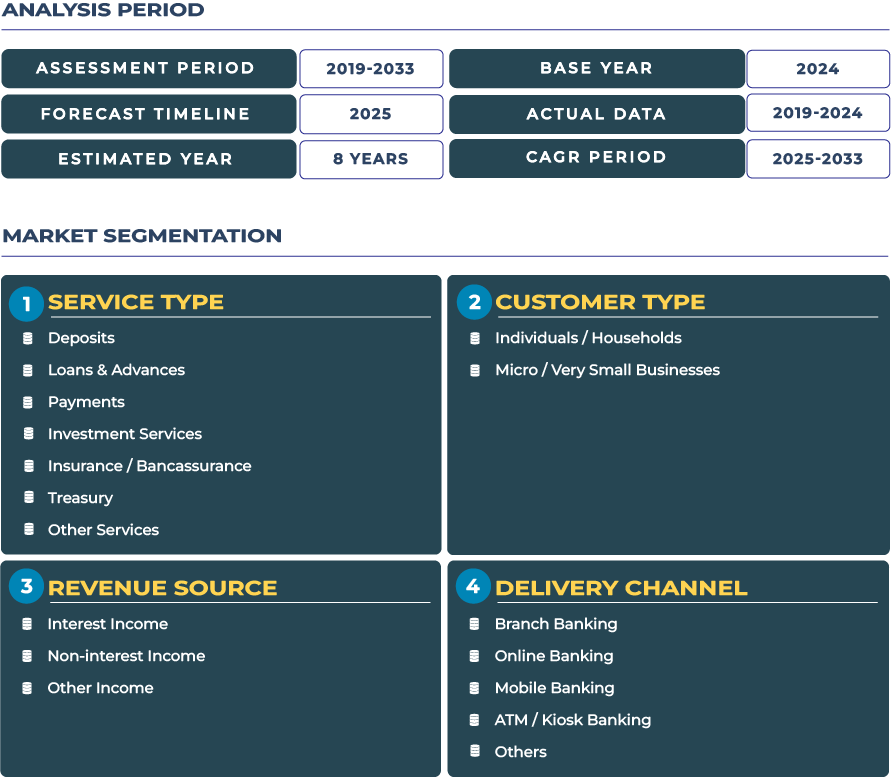Taiwan Retail Banking Market Outlook: AI and Digital Currency Integration Redefining the Financial Ecosystem
Taiwan stands at the forefront of financial innovation in Asia, where artificial intelligence (AI) and digital currency adoption are reshaping the retail banking market. With a technologically mature population and a robust digital infrastructure, the nation’s banking ecosystem is swiftly evolving toward data-driven decision-making and customer-centric models.
Note:* The market size refers to the total revenue generated by banks through interest income, non-interest income, and other ancillary sources.
According to DataCube Research, the Taiwan Retail Banking Market is valued at USD 17.4 billion in 2025 and is expected to reach USD 24.6 billion by 2033, expanding at a CAGR of 4.5% during 2025–2033. The market’s growth is supported by the Taiwan government’s focus on fostering financial innovation through the Financial Supervisory Commission (FSC) and initiatives such as open banking, fintech integration, and digital payment regulation.
Taiwan’s retail banking sector has embraced AI advisory systems for personalized investment recommendations, digital lending platforms for real-time credit evaluation, and mobile-first banking applications that streamline daily transactions. Moreover, as the Central Bank of the Republic of China (Taiwan) continues its pilot programs on a potential central bank digital currency (CBDC), the nation positions itself among Asia’s digital finance leaders. High smartphone penetration, advanced cybersecurity frameworks, and strategic collaboration between banks and fintech startups are driving the market toward sustained innovation and efficiency.
Drivers and Restraints: Balancing Digital Advancement with Market Maturity
High Tech Adoption and Fintech Collaboration Fuel Market Expansion
One of the strongest growth drivers in Taiwan retail banking industry is its exceptional technological adoption. Taiwan boasts an internet penetration rate exceeding 90%, creating fertile ground for digital banking services. The proliferation of fintech startups-supported by regulatory sandboxes and government incentives-has accelerated innovations in payments, digital wallets, and automated wealth management platforms. Leading banks are partnering with AI developers to build intelligent credit assessment systems and fraud detection tools that optimize customer onboarding and transaction security. Furthermore, the continuous modernization of payment systems, such as QR-code payments and contactless transactions, enhances consumer convenience, making Taiwan a benchmark for digital retail banking excellence.
Regulatory Complexity and Cybersecurity Challenges Constrain Rapid Transformation
Despite strong growth prospects, the retail banking sector in Taiwan faces regulatory and cybersecurity challenges that temper its expansion pace. As financial technologies evolve rapidly, compliance requirements for data privacy and anti-money laundering have become increasingly intricate. The need to maintain interoperability across legacy banking systems and new digital platforms adds operational pressure. Moreover, rising cybersecurity threats, including ransomware attacks targeting financial institutions, have led to increased investments in cybersecurity resilience. Market saturation in urban centers also limits customer acquisition opportunities, prompting banks to explore rural digital inclusion strategies to sustain growth in the coming years.
Trends and Opportunities: Redefining Taiwan Digital Banking Horizon
Digital Currency and Mobile Banking Set the Pace for Next-Generation Financial Services
The Taiwan retail banking landscape is witnessing an upsurge in mobile-first banking and digital currency integration. The Central Bank’s exploration of a digital New Taiwan Dollar (NTD) could revolutionize cross-border transactions, settlement efficiency, and payment transparency. Meanwhile, mobile banking applications have become the cornerstone of financial engagement-offering seamless fund transfers, investment tracking, and insurance purchasing in one platform. The adoption of digital payment solutions by small and medium enterprises (SMEs) and the surge in contactless payments post-pandemic underscore the nation’s readiness for a cashless economy.
AI-Powered Wealth Management and Embedded Finance Offer Strategic Opportunities
The emergence of AI-powered investment advisory and embedded finance platforms presents lucrative opportunities for Taiwanese banks. By integrating AI-driven analytics, banks can deliver hyper-personalized financial planning and real-time risk management. Neobanks, offering streamlined user experiences and transparent pricing models, are gradually gaining traction among tech-savvy consumers. Additionally, the rise of bancassurance partnerships is expanding revenue streams, as insurance and investment services are being bundled through digital channels. The growing focus on environmental, social, and governance (ESG) banking also opens new product opportunities in green loans and sustainable investments, particularly appealing to younger demographics.
Competitive Landscape: Strategic Partnerships and Digital Leadership Shaping Taiwan Banking Future
The competitive landscape of Taiwan retail banking sector is defined by dynamic strategies focused on digital transformation, AI-driven service delivery, and mobile-first engagement. Major institutions such as Cathay United Bank, CTBC Bank, and E.SUN Commercial Bank are leading innovation through the deployment of AI chatbots, digital lending ecosystems, and blockchain-enabled remittance services. In 2024, Cathay United Bank introduced an AI-driven financial advisor tool that enhanced customer engagement and portfolio optimization. Similarly, CTBC Bank strengthened its digital payments infrastructure to support small business clients amid rising e-commerce activity.
International players like HSBC and Standard Chartered continue to invest in local partnerships, leveraging Taiwan fintech ecosystem to expand their retail product portfolios. The ongoing collaboration between banks and the Taipei FinTech Association underscores the nation’s commitment to developing a globally competitive banking environment. With growing competition, institutions are prioritizing customer data analytics, omnichannel integration, and cybersecurity enhancements to differentiate their offerings and maintain profitability in a maturing digital market.







